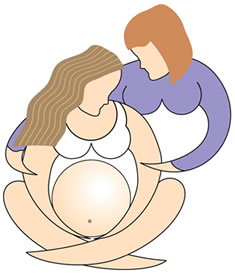Doulas: Women Serving Women
Doulas: Women Serving Women
by Cecily Arenas
There was once a time when a mother had her family and community present to support her through the birth process. A sister might massage her back during an intense contraction. Stories of other births might be heard in the room. The birthing mother would be nurtured by her own mother as she journeyed through transition. Someone the mother knew very well whether it be her partner, the community midwife, or even herself, would be there to catch the baby as s/he slithers in to the world. As the new arrival is cherished by all, mom and babe breastfeed with all of the support they will ever need.
Unfortunately due to our increasingly mobile society, families are dispersed further geographically. The extended family being present to support a mother throughout her pregnancy, birth and postpartum is a rare occurrence. Additionally, birth has been moved from the home and into the hospital over the last 100 years. Hospitals can feel very impersonal to a new mom. Often, a mother will not meet the staff until she is in labor. Continuity and nurturing are important during birth. This is where the doula comes in.
The word doula means woman serving woman. Labor doulas provide emotional and physical support for the birthing mother. During pregnancy, a doula can provide education, emotional preparation for birth, help in birth planning and answer questions. During labor, a doula can massage the mother during a tough contraction, provide sips of refreshing juice, wipe her forehead with a cool cloth, and fetch some extra pillows. She also provides reassurance and advocacy. She informs the mother of her progress in labor, translates medical terminology, and can provide information about medical procedures. She is there to help a laboring mom make informed decisions. After the birth she provides breastfeeding support and can help facilitate closure. A doula not only provides support for the birthing mother but also the partner. She can give the partner a break when needed. Doulas also decrease the use of unnecessary medical interventions. According to a study by Marshall H. Klaus, MD and John H. Kennell, MD, the presence of a doula during birth:
- Reduces the need for cesarean 50%
- Decreases the length of labor by 25%
- Decreases the use of oxytocin (pitocin) 40%
- Reduces the use of pain medication by 30%
- Decreases the use of forceps by 40%
- Requests for epidurals are decreased 60%.
Doula’s Training
A doula’s training can come from a variety of sources. Most of her training consists of a combination of the following. Some are trained in local programs by a childbirth professional, hospital or birthing center. Others have experience as volunteer doulas in a hospital or other birth setting. Some are aspiring or apprenticing midwives, childbirth educators, or birth professionals. Others are trained through a national organization such as Birthworks, Association of Labor Assistants and Childbirth Educators (ALACE), International Childbirth Education Association (ICEA), Lamaze, or Doulas of North America (DONA).
Finding a Doula
Depending on where you live, finding a doula could be a challenging process. There might be a local pregnancy and birth resource center. You could also contact the following people in your area to see if they have any names of doulas:
- La Leche League leader
- Independent childbirth educator
- Midwife
- Hospital
- Birth center
- Women’s resource center
- Natural foods/vitamin store resource board
- National doula organizations (listed under resources)
When finding a doula try to interview more than one. Figure out your own birth philosophy. Ideally this should be done prior to selecting a physician or midwife.
Ask yourself the following:
- What is my ideal birth?
- What aspects of this birth are most important to me?
- Who do I want at my birth?
- After reading up on medical interventions (Fetal monitors, tests, medications, etc.), what is my philosophy regarding the use if medical interventions?
- What does natural birth mean to me?
- How much am I willing to commit to a natural birth?
After interviewing a prospective doula ask yourself:
- Do I feel comfortable with this person?
- Will she support me in the way I need?
- Will she support my partner?
- Do I trust her?
There are many questions to ask a prospective doula. They will vary depending on your needs. Some of the more common questions include:
- Describe your birth philosophy?
- How do you work with birthing moms?
- How long do you stay after the baby is born?
- Do you provide support at home while I’m in labor?
- How will you support my partner?
- Training, Experience, number of births attended
- What methods of support do you bring to the birth?
- Do you have references?
Cost
The cost varies regionally which can be anywhere from $200-$1000. Most likely this cost will be out of your pocket. Insurance does not cover the cost of doulas as of yet. However studies are being done in hopes of changing this. The presence of a doula does save individuals and the nation money. According to Klaus and Kennell, births attended by doulas could mean a $3500 savings for individual families and therefore reflect a $2 billion annual reduction in national medical care costs. If finances are an issue for you, ask the doula if she offers sliding scale, trades or payment plans. In some areas volunteer doulas are available. Check with your local hospital or birth center.


